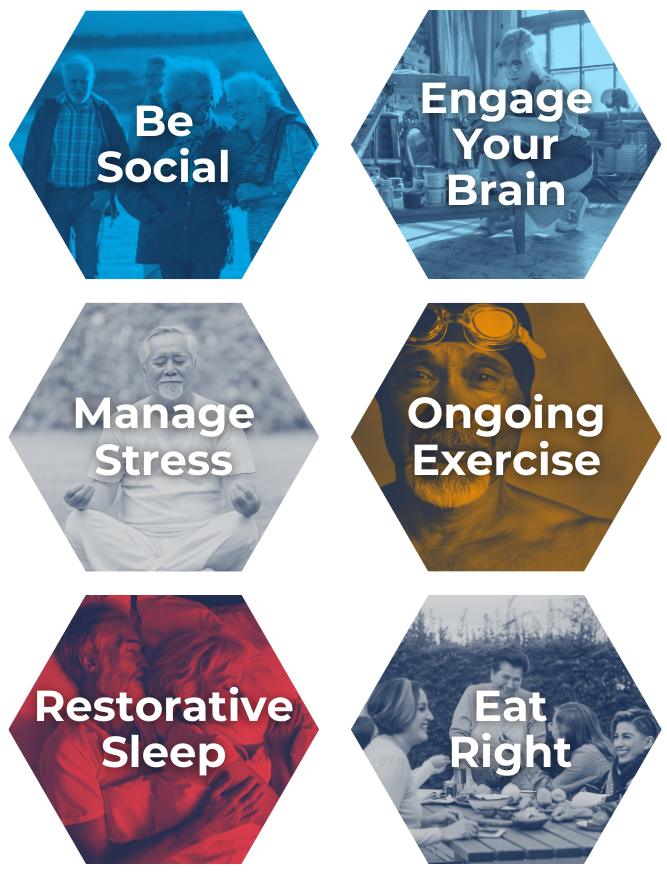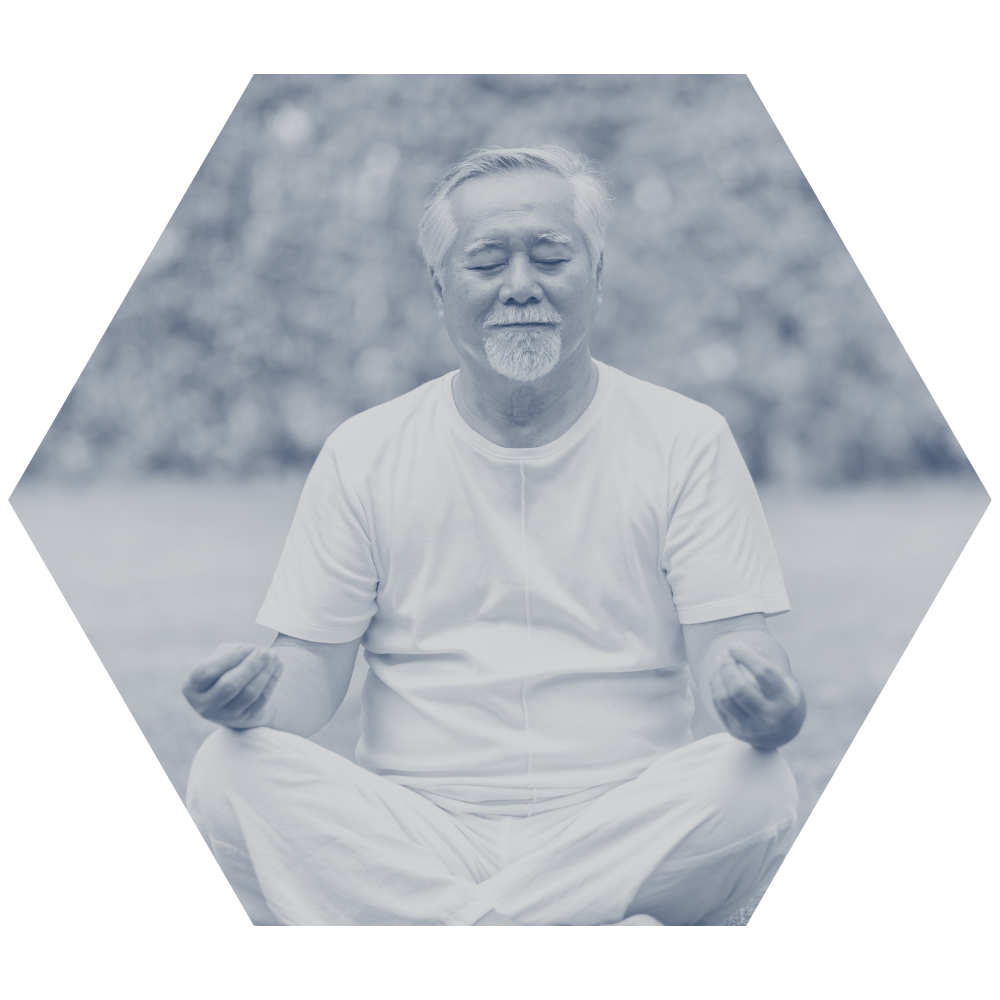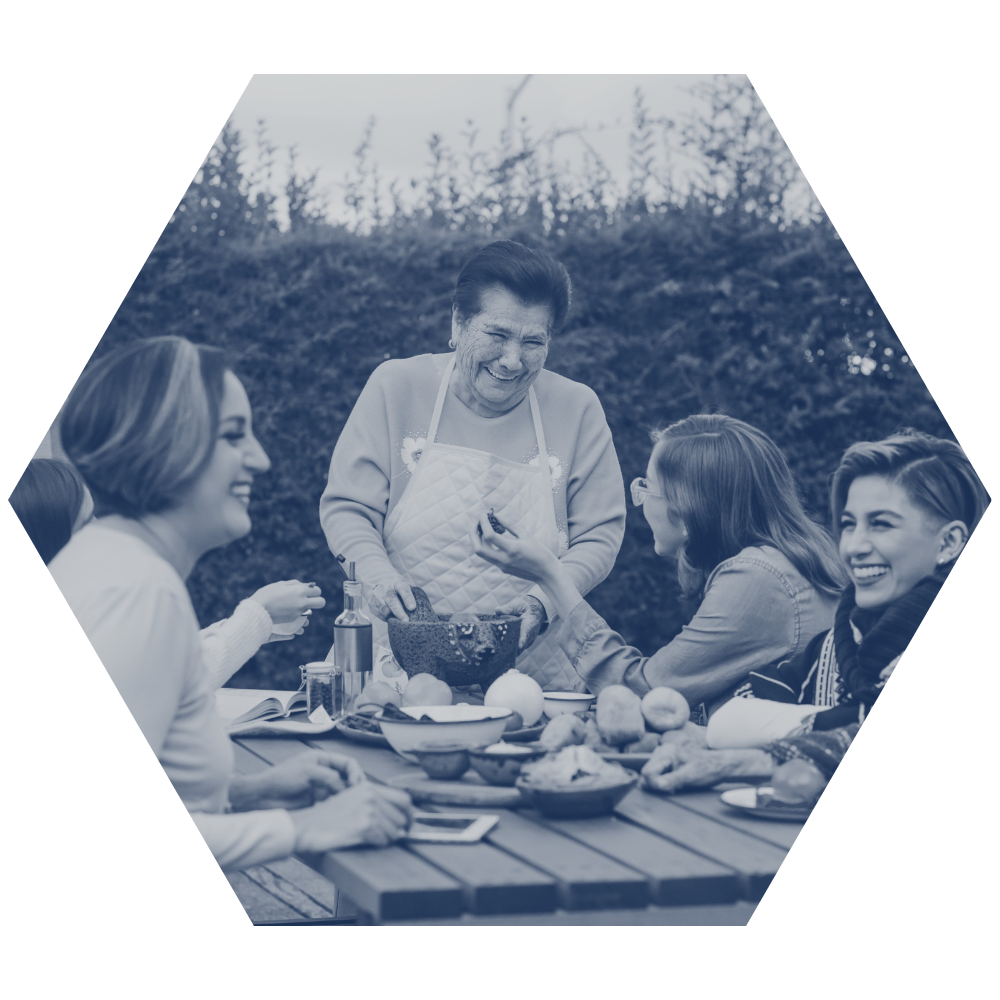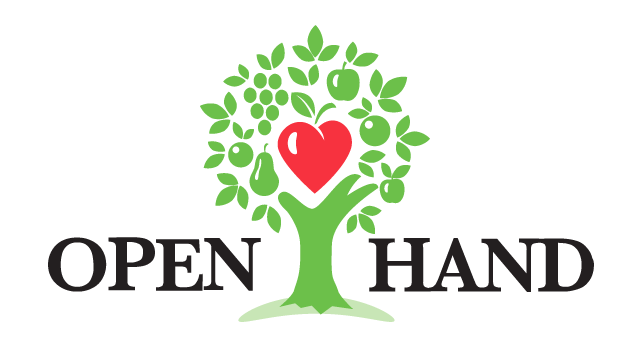The theme of On Aging 2023 is Health and Well-being, and we are excited to help our members to better understand the opportunities proactive brain health choices will provide to you and your stakeholders.
Our sponsor AARP reminds us that a healthy lifestyle helps us take control of brain health and encourages us to follow these six pillars of brain health. Throughout On Aging 2023, we will help everyone experience these pillars so you can take them home with you.
Learn more about each of the Six Pillars of Brain Health below.
Quick tips for being more social:
- Join a club that gets together on a weekly or monthly basis.
- Take a social dance class—ballroom, swing, salsa, country—whatever seems fun!
- Join a support group.
- Go to a senior center and sign up for an activity.
- Reconnect with family and friends.
- Check in with those in your social circle frequently with texts and calls.
- Go to a park or botanical garden and enjoy nature while being with others.
- Go to a coffee shop with a book.
- Take a continuing education course.
- Volunteer!
- Join a church, synagogue, temple, mosque, etc.—whatever is appropriate for you.
- Smile and make eye contact.
- Take up a new sport like pickleball or dancing!
For more on the importance of being social and tools to improve your social network, see these resources:
10 Tips for Being More Social on Your Own Terms
Activities for Individuals Living with Alzheimer's or Other Dementia
Tips to challenge your brain:
- Discover new activities and hobbies, such as learning a new language or musical instrument.
- Find a friend or mentor to motivate you, or join a group activity.
- Seek out new social connections.
- Select activities which fit in well with your schedule and are easily accessible.
- Aim to improve your performance of a new activity over time and set achievable goals.
- Use life stages and transitions—such as moving or retiring—to change things up.
- Choose activities involving mental and physical engagement, such as dancing or tennis.
- Reward yourself along the way.
- Remember to have fun!
Here are tips to help manage stress:
- Take time to develop and strengthen relationships with family and friends.
- Spend time outdoors, regularly appreciate and enjoy nature.
- Develop or strengthen your feeling of having a purpose in life.
- Find enjoyable activities and hobbies that can lift your mood.
- Engage in regular exercise to benefit the body and mind.
- Try yoga or tai chi or start a meditation practice.
- Come to peace with your past decisions.
- Accentuate the positive—even during illness, distress, or frustration.
The link between physical activity and cognitive health:
- There is ample evidence demonstrating that greater amounts of physical activity are associated with a reduced risk of cognitive decline and Alzheimer’s Disease and Related Dementias (ADRD).
- People who are more physically fit are less likely to develop Alzheimer's disease than people who are less physically fit.
- Regular exercise can significantly reduce the risk of developing dementia by about 30%. For Alzheimer's disease specifically, the risk was reduced by 45%.
- Frequent exercise (most days of the week) lessens the risk of ADRD. Activity must be intense enough to raise heart rate.
- Regular exercise also helps combat other Alzheimer’s disease risk factors such as depression, obesity, hypertension and prediabetes/diabetes.
Tips to make physical activity part of your brain health routine:
- Check to see if your Medicare Advantage plan offers a fitness program like SilverSneakers, which is available at no additional cost to eligible members and provides virtual and in-person opportunities for older adults to stay active.
- Choose a fitness option that is designed specifically for older adults to work out safely and get the most from exercise. All SilverSneakers instructors are specifically trained in senior fitness and are familiar with common health issues that affect older adults.
- Consider online and in-person options. SilverSneakers offers thousands of live classes online, so you can work out at home or when you’re traveling, as well as access to up to 22,000 fitness locations nationwide.
- If you’re just getting started at a gym, ask for a tour and request help from a trainer to create a fitness program or identify classes that will support your fitness goals.
- Give group classes a try—especially those designed for older adults. These classes will not only improve your physical health but also foster connections and friendships that can support cognitive health.
- Exercise your brain—with partners like GetSetUp, SilverSneakers offers online classes to provide mental enrichment through virtual learning.
Quick tips for quality sleep:
- Aim for 7–9 hours a night.
- Establish a bedtime routine that includes winding down before bed, setting a consistent bedtime, and waking up at the same time every morning.
- Cut back on caffeine and alcohol.
- Avoid sleeping pills unless instructed by your doctor.
- Avoid heavy meals and exercise 1–2 hours before bed.
- Keep the news, social media, and blue light out of your bed.
- Practice meditation.
- Get morning sun.
- Track your sleep.
Here are more resources on restorative sleep:
For more on the importance of sleep and tools to improve yours, visit this site.
Over 90% of serotonin is made in your gut, which means a huge part of your mood and your brain health is directly controlled by your gut.
Many foods promote the growth of the good bacteria that lives in your gut, whereas some foods can inhibit the good bacteria. As a result of this, food can be considered as one of the most effective mental health treatments available. This is significant because dietary interventions have minimal side effects in addition to being significantly cheaper than traditional medication.
Good mood foods include:
- Probiotics
- Prebiotics
- Vitamin-rich foods
- Mineral-rich Foods
- Omega-3 Fatty Acids
- Herbs & Spices
Maintain the brain with nutritious foods such as these:
yogurt, tempeh, miso, sauerkraut, kefir, kimchi, kombucha, dairy, legumes, oats, bananas, berries, garlic, leeks, onions, asparagus, citrus fruits, avocados, leafy greens, crucifers, beets, nuts, seeds, fish, shellfish, sweet potatoes, carrots, cantaloupe, lean red meats, eggs, dark chocolate, whole grains, poultry, edamame, saffron, oregano, turmeric, lavender, chamomile
Aim to eat a variety of these foods!
Here are more resources on eating right:
For more information on foods that can help brain health, check out this PDF.
For an example of a brain healthy recipe, check out this recipe for Tomato Gazpacho.














